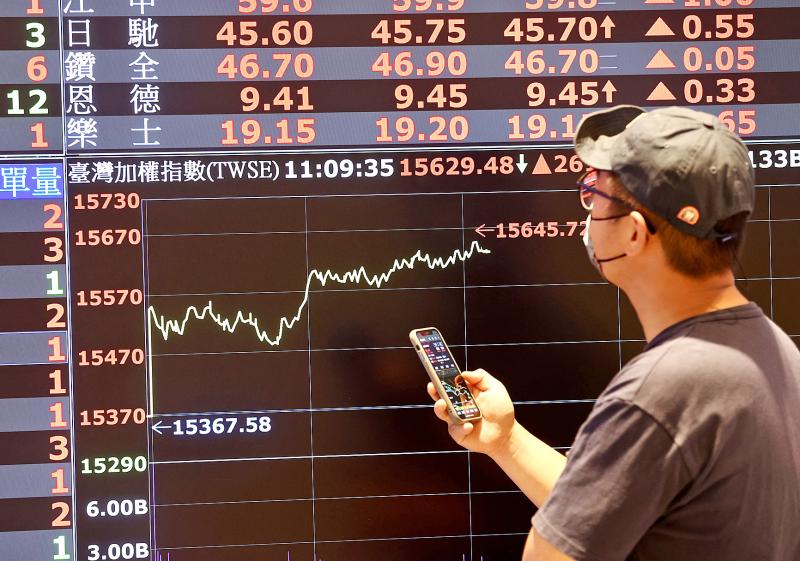Shares in Taiwan yesterday staged a solid technical rebound, surging more than 360 points as investors rushed to take advantage of a recent slump and pick up bargains, dealers said.
Buying focused on large-cap tech stocks, while financial and old economy heavyweights also rode the rebound, lending support to the broader market, dealers said.
The TAIEX closed up 361.06 points, or 2.35 percent, at the day’s high of 15,728.64. Turnover totaled NT$238.998 billion (US$8.04 billion), with foreign institutional investors buying a net NT$18.17 billion of shares on the main board, Taiwan Stock Exchange data showed.

Photo: CNA
The bellwether electronics sector, which anchored the TAIEX’s rebound, rose 2.22 percent, while the semiconductor subindex gained 1.84 percent.
“The recent selling on the local main board seems to have overshot the mark, prompting investors to pick up bargains soon after the market opened,” More Rich Securities Investment Consulting (摩爾投顧) analyst Adam Lin (林漢偉) said, referring to a decline of about 1,300 points (7.82 percent) that the TAIEX posted over the previous eight trading sessions, amid concerns about aggressive interest rate increases by the US Federal Reserve.
“With the second quarter coming to an end soon, some mutual funds are also dressing up their books for the quarter by raising their holdings to boost share prices,” Lin said. “In addition to tech stocks, financial and old economy stocks have become targets.”
The financial sector rose 3.4 percent amid hopes that a widening interest spread would boost banks’ bottom lines.
“It remains to be seen whether the main board will challenge the high technical hurdles around 16,000 points soon,” Lin said. “The TAIEX’s strength will depend on how the US markets will rebound down the road.”
In related news, Goldman Sachs Group Inc said that Taiwan-China tensions have risen to the highest in the past decade, but are now largely priced into Taiwan’s equities, based on two new indicators it has created.
The Cross-Strait Risk Index, which tracks news articles on geopolitical tensions, jumped after Russia’s invasion of Ukraine in February and the inverse correlation with broader Taiwan equities rose to the highest level in its time series, strategists, including Alvin So (蘇瑋忠) in Hong Kong and Timothy Moe (慕天輝) in Singapore, wrote in a note to clients.
“This suggests that the broader Taiwan market has started to price in cross-strait risk for the first time over the past decade,” they said.
Goldman also created a second indicator, the Cross-Strait Risk Barometer, to measure market-implied risks based on variables such as Taiwan’s tech exporters with exposure to China, as well as tourism stocks.
The analysts said the two gauges have spiked in the past three months as investors sharply priced in higher cross-strait risk and they now look to be “fairly priced.”

SEMICONDUCTORS: The German laser and plasma generator company will expand its local services as its specialized offerings support Taiwan’s semiconductor industries Trumpf SE + Co KG, a global leader in supplying laser technology and plasma generators used in chip production, is expanding its investments in Taiwan in an effort to deeply integrate into the global semiconductor supply chain in the pursuit of growth. The company, headquartered in Ditzingen, Germany, has invested significantly in a newly inaugurated regional technical center for plasma generators in Taoyuan, its latest expansion in Taiwan after being engaged in various industries for more than 25 years. The center, the first of its kind Trumpf built outside Germany, aims to serve customers from Taiwan, Japan, Southeast Asia and South Korea,

Gasoline and diesel prices at domestic fuel stations are to fall NT$0.2 per liter this week, down for a second consecutive week, CPC Corp, Taiwan (台灣中油) and Formosa Petrochemical Corp (台塑石化) announced yesterday. Effective today, gasoline prices at CPC and Formosa stations are to drop to NT$26.4, NT$27.9 and NT$29.9 per liter for 92, 95 and 98-octane unleaded gasoline respectively, the companies said in separate statements. The price of premium diesel is to fall to NT$24.8 per liter at CPC stations and NT$24.6 at Formosa pumps, they said. The price adjustments came even as international crude oil prices rose last week, as traders

SIZE MATTERS: TSMC started phasing out 8-inch wafer production last year, while Samsung is more aggressively retiring 8-inch capacity, TrendForce said Chipmakers are expected to raise prices of 8-inch wafers by up to 20 percent this year on concern over supply constraints as major contract chipmakers Taiwan Semiconductor Manufacturing Co (TSMC, 台積電) and Samsung Electronics Co gradually retire less advanced wafer capacity, TrendForce Corp (集邦科技) said yesterday. It is the first significant across-the-board price hike since a global semiconductor correction in 2023, the Taipei-based market researcher said in a report. Global 8-inch wafer capacity slid 0.3 percent year-on-year last year, although 8-inch wafer prices still hovered at relatively stable levels throughout the year, TrendForce said. The downward trend is expected to continue this year,

Taiwan Semiconductor Manufacturing Co (TSMC, 台積電), which supplies advanced chips to Nvidia Corp and Apple Inc, yesterday reported NT$1.046 trillion (US$33.1 billion) in revenue for last quarter, driven by constantly strong demand for artificial intelligence (AI) chips, falling in the upper end of its forecast. Based on TSMC’s financial guidance, revenue would expand about 22 percent sequentially to the range from US$32.2 billion to US$33.4 billion during the final quarter of 2024, it told investors in October last year. Last year in total, revenue jumped 31.61 percent to NT$3.81 trillion, compared with NT$2.89 trillion generated in the year before, according to